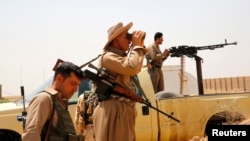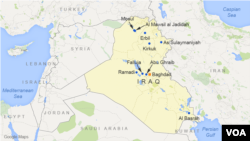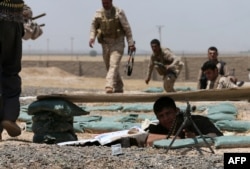A small village of minority Shiite Turkmen is being held hostage by the Islamic State, which uses the enclave as a launching point for mortars laden with chemicals, nearby residents say.
Bashir village has been under IS control since mid-2014. Located 16 miles south of the oil-rich city of Kirkuk, the Iraqi village was captured by IS following the fall of Mosul.
IS continues to launch deadly attacks on nearby towns from the village, including an alleged chemical attack earlier this month on the town of Taza Khurmatu that, officials say, caused numerous civilian injuries and the deaths of at least three people.
"The rockets spread a garlicky smell and caused nausea and vomiting," according to Soran Jalal, head of Taza Khurmatu's civil defense office. He told VOA that investigators confirmed the weapons carried mustard gas and came from Bashir.
Following the attacks, hundreds of protesters from the town blocked Iraq's main highway, demanding the removal of IS from Bashir.
Bashir is mostly surrounded by Kurdish forces and a Shi'ite militia known as the Popular Mobilization Forces (PMF), with only a small passage in the west connecting it to other IS-held territories.
According to Kurdish Major General Westa Rasul, the presence of IS is a significant threat because the village is close to the North Oil Company and a power plant that provides 35 percent of Iraqi electricity.
"A humanitarian disaster is awaiting us if the village is not liberated soon," he said. "Coalition forces and the Iraqi government are to blame if this happens."
No coalition help
Unless coalition forces provide aerial support, removing IS from the village is impossible because of numerous mines and explosives the extremists have planted, Iraqi and Kurdish officials say.
But the coalition has refused to provide aerial support, fearing that doing so may strengthen the PMF, officials say.
PMF is an umbrella organization of several Shi'ite militias formed in 2014 after the Iraqi army fled the area following IS attacks. The U.S. government has a complicated relationship with the organization because some of its militia groups are close to Iran and are on the U.S.-designated terrorist organization list.
"Our policy is to support forces with and under the direct control of the government of Iraq," U.S. Army Colonel Steve Warren, spokesman for the coalition's operation against IS, told VOA.
In an interview with CBS News, retired General John Allen, former special presidential envoy for the global coalition to counter ISIL, said: "It's really important to understand that the militias are not just a single monolithic entity. There are the militias that you and I are used to hearing that have close alignments with Iran. Those are the extremist elements, and we don't have anything to do with that."
ISIL is an acronym for Islamic State.
Other impediments
"Liberating Bashir will take only a few hours if there is coordination," said Lieutenant General Anwar Hamad Amin, a commander of the Iraqi air force. But "we have no plans yet to liberate it because there needs to be coordination with forces on the ground first," he told VOA.
Zeki Kemal, a commander of PMF, told VOA that his group plans an attack on the village but said his forces lack weapons and aerial support.
"We tried to liberate the village twice before, but we failed both times because we lack ammunition and air support," Kemal told VOA.
Michael Knights, a Washington Institute fellow and expert on the region, told VOA that the PMF leadership in Baghdad has not asked the coalition to provide air support to their units.
"If a friendly fire incident happened, and coalition airstrikes killed Shia PMF, there is a concern amongst the Shia PMF leaders and the coalition that extremists would retaliate against coalition trainers and embassies," Knights added.
According to Kemal, after the alleged chemical attacks by IS, the Iraqi government started negotiating with the coalition forces for aerial support for his forces. Kurdish forces that have direct aerial support from the coalition and have surrounded the village from the north and the west said they have not moved into the village because its residents are not ethnically Kurdish.
Rasul told VOA, "We told Popular Mobilization Forces, ‘Let Peshmerga [Iraqi Kurdish forces], with coalition support, liberate the village, and we will let you move in later.’ However, they refused, arguing it was a Shi'ite village and should be under their control. They agreed on our proposal later, but then the coalition rejected it."
Following the alleged chemical attacks, Kurdish officials met with Iraqi officials and the Shiite PMF leader to reach an agreement to free the village in a joint operation.






